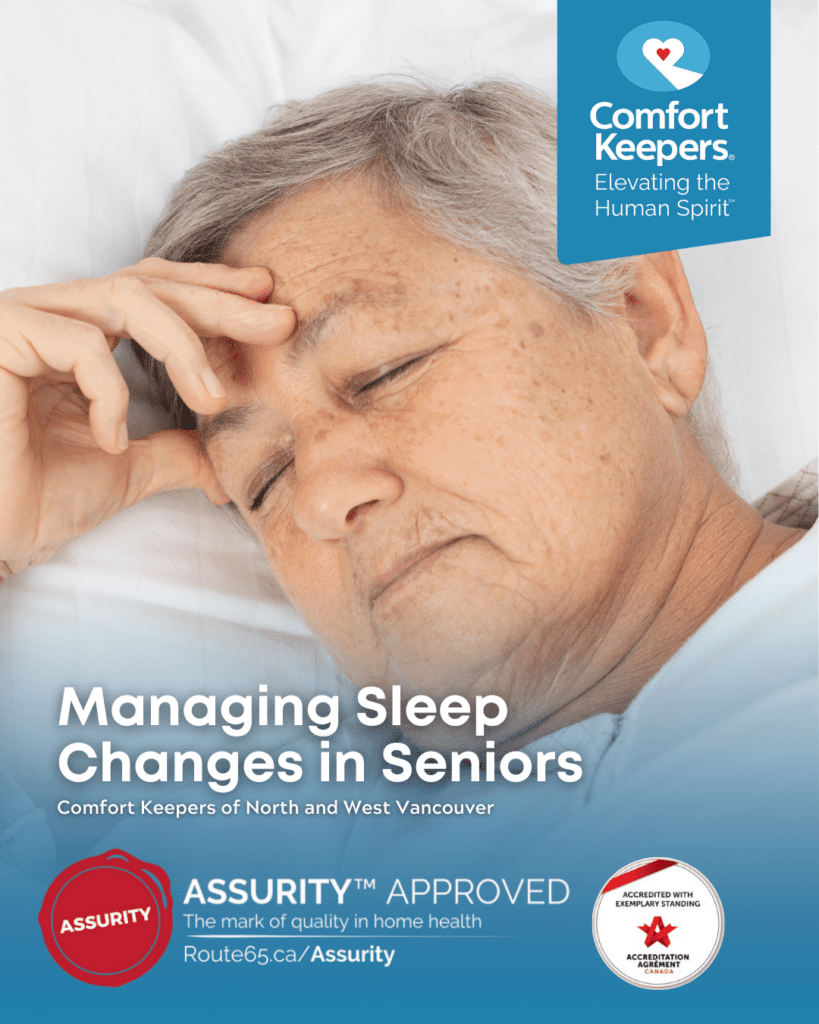Managing Sleep Changes in Seniors
Wellness | March 15, 2022

What Every Senior in North Vancouver and West Vancouver, BC, Needs to Know About Getting Enough Sleep
Sleep changes in seniors can happen for a variety of reasons. Insomnia and the inability to stay asleep are common complaints of older adults. It is not uncommon for seniors to sleep lighter than they did when they were young but, a good night’s sleep is still necessary. Having insomnia or feeling sleepy throughout the day could indicate an underlying problem.
Sleep quality affects general health, just as physical symptoms do. Older adults with healthy sleep patterns may sleep less or less deeply but will feel rested and energetic during the day. Seniors who get less sleep are tired and lack energy may need to address the underlying causes of their insomnia and nocturnal wakefulness.
Sleep Changes in Seniors: What causes insomnia and nighttime wakefulness?
Many factors can contribute to insomnia and wakefulness. Lack of exercise, improper diet, and unstructured days may cause some seniors to have insomnia. Medications can interfere with normal circadian rhythms and cause drowsiness during the day or alertness at night.
Physiological factors such as nighttime pain, illness, dementia, heart disease, or problems breathing while sleeping (sleep apnea) can interfere with sleep. Insomnia and wakefulness are also strongly associated with psychological factors such as depression or anxiety. Finally, poor sleep habits (see below) can strongly contribute to insomnia.
Sleep Changes in Seniors: Can seniors improve their sleep quality?
The first step is to assess and change any poor sleep habits. Poor sleep habits include drinking alcohol, caffeine, or too many fluids in the evenings; smoking (nicotine affects sleep); exercising before bed; and eating late meals.
It is important to associate the bed with sleep and intimacy by not reading, working, eating, or watching television in bed. Also, seniors should not try to go to bed when they just are not tired. Some studies indicate that increasing the amount of time spent in bed can interrupt normal circadian rhythms. Limiting bedtime to 7 to 8 hours may improve sleep quality.
Additionally, seniors should limit napping, which can cause nighttime wakefulness and engage in relaxation techniques before bedtime.
Senior adults who experience insomnia may want to talk with their doctors to determine if physical problems or medications are affecting their sleep. They should be sure to discuss any physical or breathing discomfort, pain, urinary problems, or other factors they notice are keeping them up at night.
They should also note the amount of caffeine and alcohol they ingest and whether they feel anxious, stressed, sad, depressed, or nervous. Identifying physical or psychological problems or sleep disorders and treating them can help individuals overcome insomnia and sleep interruptions, so they can get a better, more restful night’s sleep.
The Best Senior Home Care in North and West Vancouver is Comfort Keepers®
Our senior home care agency offers in-home care focusing on aging in place. Our services include dementia care, end-of-life care, post-surgery care, and palliative care. Comfort Keepers can assist seniors with living transition services, personal care, companionship care, and more!
Quality and Accredited Elderly Care: Happier, Healthier, and at Home with 24/7 Senior Care Opportunities!
Do you need a home care solution for yourself or a loved one? Have you been thinking about retirement homes and their alternatives as a solution? Comfort Keepers® enables seniors to maintain happy, healthy lives in the comfort of their own homes. In-home care services are available in North Vancouver, West Vancouver, and the surrounding areas.
Comfort Keepers® is a Senior Care Agency That Can Make a Difference with Interactive Caregiving™
Our in-home caregivers ensure our senior clients have the best quality of life. The Interactive Caregiving™ program ensures that a senior’s safety, nutrition, mental well-being, and everyday needs are met. This program brings joy and good health to each client’s home.
Comfort Keepers® North Vancouver and West Vancouver Can Help with In-Home Elderly Care Services!
If you are concerned about the health and well-being of a loved one we can help! Comfort Keepers offers 24-hour care and delivers top-quality and compassionate care for seniors. We are dedicated to safety technology solutions that foster independence and enhance well-being.
Locally Owned and Operated Home Health Care Agency
Our care centers around companionship for seniors. Empathetic care originates from the soul and allows us to meet our client’s requirements. The seasoned in-home caregivers employed by Comfort Keepers are carefully chosen based on their empathetic qualities.
Contact the Comfort Keepers® North Vancouver and West Vancouver office at (604) 998-8806 to learn more about our unique in-home care solutions for seniors.
Comfort Keepers is an Accredited Senior Care Agency in North and West Vancouver, BC
Accreditation is a rigorous process that involves industry experts evaluating an organization’s processes, policies, and procedures. Comfort Keepers® North and West Vancouver has been awarded Exemplary Standing by Accreditation Canada. This achievement recognizes that Comfort Keepers® meets or exceeds the stringent quality standards for Home Care companies established by Accreditation Canada.
References
Carskadon, M.A., Brown, E. and Dement, W.C. (1982). Sleep fragmentation in the elderly: Relationship to daytime sleep tendency. Neurobiology of Aging, 3, 321-327.
Geriatric Mental Health Foundation. (n.d.). Sleeping well as we age: Insomnia is not a normal part of aging. Retrieved from http://www.gmhfonline.org/gmhf/consumer/factsheets/hlthage_sleep.html.
WebMD. (2013). Aging and sleep. Retrieved from http://www.webmd.com/sleep-disorders/guide/aging-affects-sleep.
Individualized Home Care Options
Long-Term Home Care, 24 Hour Home Care & Short Term Care Options Customized for You





